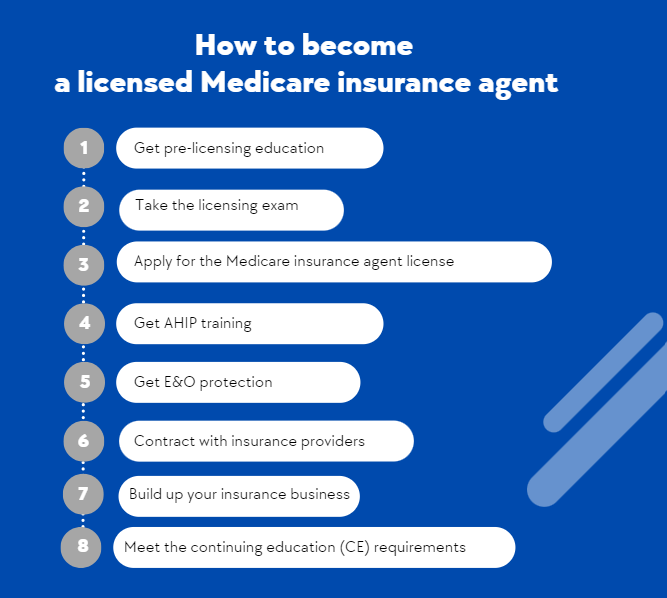

If you’re looking for an occupation with a lot of income potential that also lets you help a lot of people, why not start selling Medicare insurance? It’s been projected that by 2030, there will be way more Americans aged 65 or older.
What this means is that there will be plenty of senior citizens who will need the assistance of Medicare providers and Medicare insurance agents. To take advantage of this opportunity, you will need licensed Medicare insurance agent training to cater to this large market in the near future.
In this guide on how to become a licensed Medicare insurance agent, Insurance Business will answer the relevant questions around this topic. You’ll learn why this training is important and the different steps to obtaining insurance agent certification for Medicare.
As the title suggests, a licensed Medicare insurance agent is an expert with the qualifications and knowledge to inform clients about Medicare plans. When you become a Medicare insurance agent, you may represent several different insurance carriers. Your role will be to assist clients in choosing the Medicare plan that suits them best while making an objective and truthful assessment of available plans.
Medicare insurance agents perform an important function: poring over different Medicare plans and assessing their features. After considering your clients’ needs, you can then match them with the most suitable Medicare plan options.
While medical training is not a formal requirement, it is recommended for:
These programs do more than teach you what you need to know about Medicare products – you will also receive sales training.
Getting licensed Medicare insurance agent training is only one part of the process. Having this insurance license does not guarantee success when you sell Medicare advantage plans or other Medicare-related products. The sales training can provide you with the essential soft skills to help you connect with senior clients on a personal level and convince them of your concern for their well-being.
Skills like these can also come in handy when you want to become a generalist insurance agent. To become one, read our guide on how to become an insurance agent.
To become a Medicare insurance agent, meeting the eligibility requirements is essential. In most states, you will have to be:
Some states may also require that you have pre-licensing education. You can check the National Insurance Producer Registry (NIPR) to know the exact prerequisites for that state that you live in.
After meeting the eligibility criteria, it’s time to get your licensed Medicare insurance agent training and get on the path to becoming a Medicare insurance agent. These are the steps involved:
Regardless of whether a pre-licensing education is required by your state, it is still a good move to take up a pre-licensing course. In many US states, you will be required to get at least two insurance licenses: a life insurance license and a health insurance license.
These two licenses are typically required, since health insurance and life insurance licenses will equip you with the basic knowledge to make you a better agent. Getting these can also increase your chances of passing the Medicare license exam on your first try. To get the right pre-licensing education, you can check your state’s list of approved courses on the insurance section of their official website.
After completing your pre-licensing education, you can schedule your Medicare licensing exam. Expect the Medicare licensing exam to test your knowledge on:
Most licensure exams of this type require paying a fee and presenting a pre-education certificate of completion.
Once you pass the exam, you can then apply for the license via your state's insurance division or NIPR. To apply, you must provide the following:
Check the application requirements in your state in case other documents are needed so that your application goes smoothly.
America’s Health Insurance Plans (AHIP) is the nonprofit organization that provides yearly Medicare and Fraud, Waste, and Abuse (MFWA) training. This supplemental training program complies with standards set by the Centers for Medical & Medicaid Services (CMS).
Insurance carriers require this training for Medicare insurance agents to ensure that they understand and stay updated with the latest CMS regulations and guidelines. Those who acquire AHIP certification must pay a fee of $175, and they can take the course online.
Also known as E&O insurance, this is meant to protect you and your business from potential claims arising from negligence, errors, or omissions committed while doing business. For this type of insurance, you can choose individual or business coverage.
It’s best to get policy coverage with a limit of at least $1 million to $3 million. Most insurance companies will require this much coverage before you start selling their plans. The premiums you pay for this insurance can be from $300 to $500 a year.
To have a variety of insurance options and greater chances of success with your clients, it is recommended that you sign up with several insurance companies.
In your efforts to find the best insurance carriers, it can be frustrating to research them, draft contracts, and negotiate commissions. When you reach this part of the process, you can enlist the services of a field marketing organization (FMO). Choose a good FMO that can give you the tools and services that let you focus on building better relationships with your clients.
Now that you’re equipped with a license and carrier contracts, it's time to start building your book.
Don’t hesitate to harness your network and attend community events. Make sure you have an online presence to reach potential clients.
As you develop your skills and grow your network, you’ll discover that building trust and rapport with your clients is essential. Happy clients can give you referrals in the future.
Being a Medicare insurance agent demands that you remain up to date with the new regulations, industry changes, and new plan offerings. Typically, you will have to meet the CE requirements by taking 24 approved credits every two years. Don’t forget to check with your state’s insurance department and know exactly what is required to keep your license.
Here’s a summary of the steps for licensed Medicare insurance agent training:

Once you pass the Medicare insurance agent licensing exam and get your application approved, you will have more than a few questions about what to do as a newly approved agent. Here are some common options:
Also known as Medicare Part C, this is a health insurance plan afforded by private health insurance companies. While it doesn't technically replace Medicare parts A and B, it does replace how your clients can use the benefits.
Speaking of Medicare Advantage Plans or Medicare Part C, here’s a video that covers the pros and cons of this type of plan. The presenter also debunks a few myths about Medicare Advantage plans:
Also called Medigap, this is a Medicare Supplement Insurance policy that helps fill what’s missing in Original Medicare. Medigap is designed to help cover health care costs like Copayments, Coinsurance, and Deductibles.
This Medicare plan is a stand-alone plan for Medicare recipients who want to buy this separately to pay for their prescription medication. Your clients cannot have stand-alone drug and Medicare Advantage plans at the same time.
In most cases, independent Medicare agents earn their money from commissions on the plans they sell. Their income depends on the types of plans they sell. Typically, whenever you get a client to buy one of your plans, the insurance company pays your commission via check or direct deposit.
The CMS handles compensation paid to agents who sell Medicare Advantage. One great benefit of working as a Medicare agent is that when your client stays in your book of business, you can get their renewals forever. Also, Medicare agents get a commission, which is a percentage of a premium when they sell Medicare Supplement plans. These can be excellent sources of residual income.
As with other insurance jobs, a career as a Medicare insurance agent calls for a lot of hard work and discipline. But if you do the job well and play your cards right, this can be a long and rewarding career, both financially and personally.
For aspiring Medicare insurance agents, there’s good news on the horizon: according to the CMS, it’s estimated that Medicare enrollment in the US will reach 93.6 million as soon as the year 2031.
So, you may want to think about getting that Medicare insurance agent training soon.
Did this article make you consider getting licensed Medicare insurance agent training? Let us know your thoughts in the comments.
